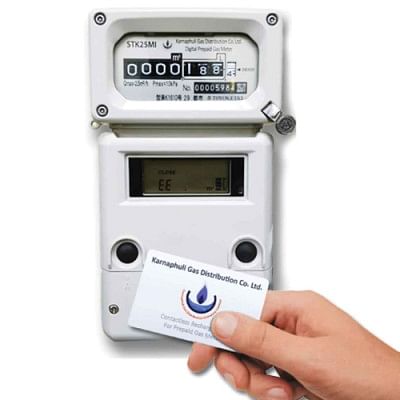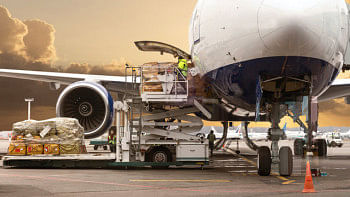No alternative to prepaid metres to save energy

There is no alternative to installing prepaid metres in residential areas to stop people from availing illegal gas connections and save energy for the future, experts told a virtual webinar yesterday.
Titled "Future of Industrial Fuel Source in Bangladesh: LPG and LNG", the webinar was organised by the Dhaka Chamber of Commerce and Industry (DCCI).
Speakers there urged for extensive exploration for natural gas to ensure cost effective energy supply in the industries in future.
Liquefied natural gas (LNG) and liquefied petroleum gas (LPG) are being used in industries but the volume is very low because of its high price, they said.
Still natural gas is very cost effective for industries and emphasis must be placed on the energy mix and diversification, they added.
An average price for 78 cubic metres of gas is being charged for every burner although 40 to 45 cubic metres of gas is used on an average in homes, they said.
Consumers are paying extra without using gas while gas distribution companies are squandering away money by selling off this unused gas through illegal connections, said experts.
They also said gas distribution companies were reluctant to connect prepaid meters to retain their illegal earnings.
Kohondkar Saleque Sufi, director of Global Consultant and Educational (Aust) Pty, in a keynote presentation, said, "Only 15.21 per cent of the country's total demand is from domestic connections."
Most of them pay Tk 975 but they do not use the same amount in gas. A survey by the Titas Gas Transmission and Distribution Company found that a residential burner used on an average 40 to 45 cubic metres of gas but paid for 77 cubic metres, he said.
Sufi, also a former director of Titas, said bills of people using prepaid meters reach Tk 400 to Tk 500 per month but those without a meter pay Tk 975. There is a cycle of making money illegally by enabling illegal gas connections to sell off the gas unaccounted for.
He also called for an investigation into why the distribution companies were so reluctant to install prepaid meters despite it being popular in residential areas.
"Gas exploration at present is not enough. Bangladesh is now the 30th largest natural gas reserving country. We have to enhance the infrastructure of land-based terminals to make LNG and LPG popular and cost effective in future," he said.
For the industries, he also suggested using renewable sources of energy such as rooftop solar panels and eco-friendly water harvesting methods.
Anisur Rahman, senior secretary, Energy & Mineral Resources Division, as chief guest said, "The average gas bill collected at residential areas is unreasonable."
"We will face problem if anyone goes to court about this issue. The government is putting emphasis on prepaid meters to stop illegal connections," he said.
He also said the government had not stopped gas exploration, rather 100 million cubic foot gas had been added to the national grid recently.
"It is good news that we have found a new gas field in Zakiganj where Bapex (Bangladesh Petroleum Exploration & Production Company) will explore gas. Our capacity for onshore gas exploration is quite satisfactory but for offshore gas exploration we still encourage foreign explorers," he added.
He also informed that the government would establish an LPG terminal in Matarbari with a capacity of 12 million tonnes, where ships of capacities of 40,000 tonnes would be able to dock.
Once available, costs will reduce by one third. Despite all the LPG use, its use in the industry is very low. Focus is required on local gas exploration first, he added.
He also agreed that the western side of Bangladesh was still deprived of the required gas connections.
Md Maqbul-E-Elahi Chowdhury, member (Gas), Bangladesh Energy Regulatory Commission, said, "At present we have 3,300 million cubic feet of gas, of which 74 per cent comes is local gas and 26 LNG."
"We have to open a data center to expedite local gas exploration and we have to allow foreign explorers since it is not possible for BAPEX alone to do the job," he said.
"LPG is environment friendly and healthy and at present, 1.2 million tonnes of LPG is being used. If the price of LPG comes down and becomes affordable to the lower middle-income level, by the year 2025 about 3 million tonnes of LPG will be needed," he added.
DCCI President Rizwan Rahman said energy plays a pivotal role in the economic development and industrial progress of a country.
The growing energy need for diverse economic operations demand a blended energy mix to offset the shortages of gas, he said.
Rahman also mentioned that to accelerate the industrial growth in a planned and more environment-friendly way, more focus was needed on the import and production of alternative fuels like LPG and LNG alongside natural gas exploration.
Professor M Shamsul Alam, dean, Faculty of Engineering, Daffodil International University, said "Although the government subsidises LPG and LNG, it is not benefiting the general consumer level. We have to be competitive in terms of price of energy."
He further recommended rationalising and reducing the price at the end-user level.
According to the Bangladesh Oil, Gas and Mineral Resources Corporation (Petrobangla), there were 4.3 million legal gas connections under the six gas distribution companies in the country.
Of these, more than 42 lakh are residential but only 260,000 have been brought under pre-paid meter facilities.
Faruque Hassan, president of the Bangladesh Garment Manufacturers and Exporters Association, Assistant Professor Shahriar Ahmed Chowdhury of United International University, Aameir Alihussain, Managing Director, Bangladesh Steel Re-Rolling Mills, DCCI Senior Vice President NKA Mobin, former director Nuher L Khan, Director Arman Haque and Convenor Malik Talha Ismail Bari also spoke.

 For all latest news, follow The Daily Star's Google News channel.
For all latest news, follow The Daily Star's Google News channel. 



Comments